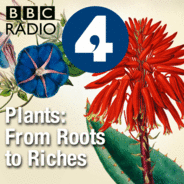The 18th-century botanical impresario Sir Joseph Banks was convinced that Britain's destiny was as the major civilising power in the world, and this could be achieved by harnessing botany and imperial progress to each other's mutual benefit.Professor Kathy Willis talks to Linnaean Society honorary archivist, Gina Douglas, on how Britain's acquisition of Carl Linnaeus' collection of books and specimens proved the tool to promote, identify, and trade plants across the Empire.She hears from Richard Barley, Director of Horticulture at Kew and former director of Melbourne's Botanic Gardens, who discusses Banks' influence on the choice of plants taken with the first settlers to Australia.But how central were plants to Britain's colonial project? Historian Jim Endersby weighs up Joseph Banks' 18th-century vision to use Kew as a centre to gather as many plants and plant products as possible, not only to enrich the Royal Garden's collection but for Kew to also function as a botanical exchange house between the colonies.Producer: Adrian WashbournePresenter: Kathy Willis is director of science at Royal Botanic Gardens at Kew. She is also professor of long-term ecology and a fellow of Merton College, both at Oxford University. Winner of several awards, she has spent over 20 years researching and teaching biodiversity and conservation at Oxford and Cambridge.

Wissenschaft & Technik
Plants: From Roots to Riches Folgen
Kathy Willis considers our changing relationship with plants over the last 250 years - from tools to exploit, to objects of beauty, to being an essential resource we must conserve.
Folgen von Plants: From Roots to Riches
30 Folgen
-
Folge vom 22.07.2014Plants to Shape Society
-
Folge vom 21.07.2014A Rose by Any Other NameThe 18th-century's age of travel and enlightenment meant that a vast influx of newly discovered plants into Europe was creating a botanical tower of Babel. No common language for plants and a wealth of long and localised names made communication about plant species often impossible. Swedish naturalist Carl Linnaeus dedicated his life to developing a proper system of naming and placing plants into a new ordered hierarchy.Professor Kathy Willis launches the series by talking to Jim Endersby, historian at Sussex University, who argues that Linnaeus' system of plant classification established the roots of botany as we now know it and revolutionised the economics and movement of plant species and their riches across the globe, and how they are referred to.She speaks with Linnaean archivist Gina Douglas and learns how in 1753 his System Naturae placed plants into a hierarchy of relationships based on the number of reproductive organs, in the hope of uncovering the machinery of nature. Whilst much of what Linnaeus developed has now been superseded by a more natural system of classification, his method of naming still dominates today.Producer: Adrian WashbournePresenter: Kathy Willis is director of science at Royal Botanic Gardens at Kew. She is also professor of long-term ecology and a fellow of Merton College, both at Oxford University. Winner of several awards, she has spent over 20 years researching and teaching biodiversity and conservation at Oxford and Cambridge.
